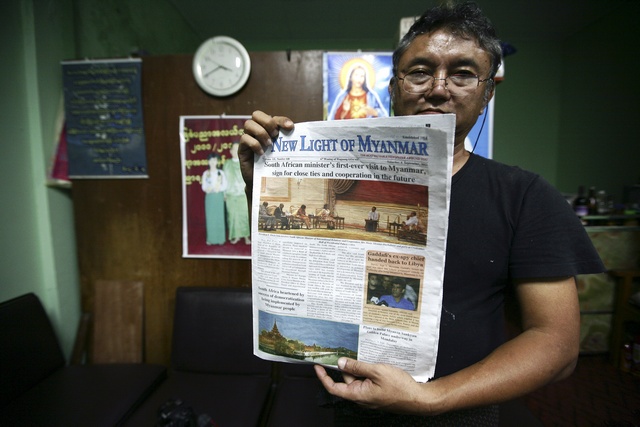A draft Public Service Media Law, intended to separate current government sponsored media sources from their political roots, is being discussed in Parliament.
The bill was drafted with assistance from UNESCO and submitted to parliament by Minister of Information Aung Kyi on Monday. On Tuesday the bill was rejected by the Interim Press Council (IPC), which has opposed the legislation since it was submitted to the drafting committee last year.
While the details of the bill have not yet been released, it is designed to transform government mouthpieces New Light of Myanmar and MRTV into a Public Service Media, which would be funded by the government but monitored by independent press and broadcast councils.
In a statement during the initial stages of the drafting project, UNESCO said that the bill was intended to establish the “independent Press Council and a Broadcast Council” as well as ensure “no a priori censorship, the adherence to principles of freedom of expression and the right to information, and a framework for new online media.”
Critics argue that the bill is too vague, and that authorities are being secretive about how it will be implemented. Many also worry that the allocation of state budget to the media will make it difficult for private newspapers to compete.
Myint Kyaw of the Myanmar Journalists Network said that while the government claims that the law is intended to ensure impartiality, newspapers and broadcasts that have always been tightly controlled by the government cannot be immediately accredited simply by redirecting their revenues.
“The Ministry says it is concerned over the impartiality of the private media. That is why they have to do the Public Service Media.,” he said. “But for decades of doing propaganda, it is also very doubtful that the government media will be impartial”.
While the IPC has publicly condemned the current legislation, the council cannot prevent the bill being passed by parliament. The IPC likewise had concerns over the recently passed Printing and Publishing Enterprise Law, which was drafted by the Ministry of Information and moved through parliament in tandem with the council’s Media Law.
Media freedom advocates, as well as the IPC, have taken issue with several aspects of the government-drafted law, which will soon come into effect. UN Special Rapporteur on Human Rights in Burma, Tomas Ojea Quintana, stressed in his final report on Monday that Burma has retained many limitations on press freedom, and urged the Burmese government to allow a more integral and influential role for the Press Council.
[related]



